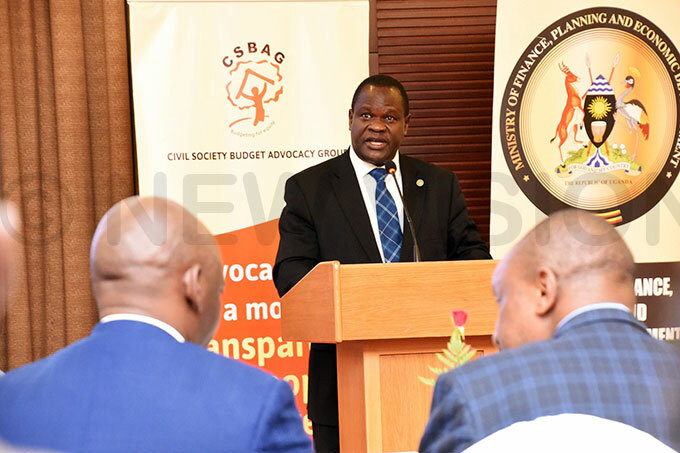Public query finance ministry on budget implementation
The members of the public said the budget proposals were easy to read but walking the talk would be much harder.
BUDGET FINANCE
The public has expressed concern about the government's ability to implement the budget proposals comprehensively.
The members of the public said the budget proposals were easy to read but walking the talk would be much harder.
Other members of the public also noted that there was little value for taxpayers' money. "The roads and roadsides are full of mud and potholes, why is this," said a retired soldier and teacher.
This was during the national post-budget speech dialogue for the financial year 2019/2020 at the Kampala Serena Hotel. It was organised by the ministry of finance, planning, and economic development.
Finance minister, Matia Kasaija said they had targeted Uganda to reach middle-income status by 2020 where average income to be earned in a year would be $1,033 (sh3.7m) but that not was possible. Kasaija said average incomes currently stand at $825 (sh3m) per year.
"We want everyone to be rich. But not everyone can be rich, some will have more some will have less," said Kasaija in a similar meeting in Hoima district.
 Patrick Ocailap, Deputy Secretary to the Treasury Ministry of Finance making a presentation during the first ever joint National post-budget dialogue at Serena Hotel Kampala. (Photo by Mpalanyi Ssentongo)
Patrick Ocailap, Deputy Secretary to the Treasury Ministry of Finance making a presentation during the first ever joint National post-budget dialogue at Serena Hotel Kampala. (Photo by Mpalanyi Ssentongo)
Kasaija noted that any Ugandan who was doing some entrepreneurial activity cannot; "complain of extreme poverty". He cited the example a one Joseph who drives white Suzuki selling pancakes in Kampala. "The man is driving and making money. He has built his house," Kasaija said.
Julius Mukunda, executive director of Civil Society Budget Advocacy Group said the capacity to deliver and execute projects is wanting. "What do we do to ensure the funds we borrow are rightfully used," Mukunda said.
"SMEs cannot access credits from the Uganda Development, the Agriculture Credit Facility, such credit are for the big boys," Mukunda said.
On external debts, he said developed countries like USA have debt to GDP ratios exceeding 100%, but they are able to execute projects and repay loans.
Adam Mugume, executive director-research Bank of Uganda said if these economic plans were well implemented there would not be need for worry about debt sustainability.
"We need to improve on public investment management then the economic growth would be higher than 6%," Mugume said.
Patrick Ocailap, deputy secretary to the treasury said the economy was still in deficit of various infrastructures such as roads despite the fact that a lot of funds were being allocated to infrastructure.]
Ocailap said technology and skills shortage was hampering economic growth. He said the economy was faced with the problem of high unemployment, income inequality, and malnutrition. He noted that unhealthy lifestyles were costing Uganda $500m (sh1.8b) to treat preventable diseases.
Mike Nsereka, an official from the NEMA said the funding to NEMA was too low to enable them manage the environment. Nsereka said the country was facing the ferocity of the climate change such as mudslides, floods, heat yet budget was little to protect the environment and livelihoods.
Moses Ogwal director policy advocacy Private Sector Foundation asked government to consider small and medium-size firms to write off their tax arrears. "I am concerned that the target for local revenue collection is to increase by 20% but the budget does not show how the economy will grow to act as a base for this ambitious revenue collection. We are worried you might be descending on the private sector which to collect revenues will squeeze out the SMEs," Ogwal said.
Gideon Badagawa, Private Sector Foundation said the economy was growing at 6% but 68% of Ugandans in the informal sector were not benefiting.
Badagawa said the rate of economic growth would not enable Uganda reach middle-income status by 2020. "If the economy continues to grow at 6%, it would take 15 years to achieve the $1200 per capita to reach middle-income status," he said.
The public called for improving the quality of goods made in Uganda to enable them to compete regionally and internationally. They expressed concern about low funding to transform agriculture, lack of access to credit for small businesses, lack of shared economic prosperity.